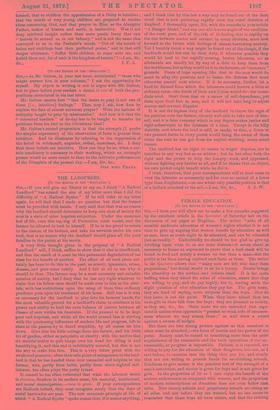THE LABOURERS.
(To THE EDITOR OF THE " SPECTITOR.1
StR,—If you will give me liberty to say so, I think "A Radical Landlord" has missed the aim of my letter more than 1 did the difficulty of "A Radical Squire." If he will refer to my letter again, he will find that I made no question but that the farmer must be provided with hands. I only said that that was no reason 'why the landlord should determine to keep one class of society for ever in a state of utter hopeless subjection. Under the economic law of life, even this tag-rag of Protection must vanish, and the farmer be allowed to look to himself. If he is too proud to return to the custom of his fathers, and take his servants under his own (roof, that is no reason why the landlord should place all the poor families in the parish at his mercy.
A very little thought given to the proposal of "A Radical Landlord" will, I think, suffice to show that it also is insufficient, and that the result of it must be this permanent degradation of our class for the benefit of another. The effect of all such plans cer- tainly has been to do this in the past, as misery, ignorance, crime, -disease, and poor-rates testify. And I fail at all to see why it -should be thus. The farmer may be a most necessary and valuable member of society, but I deny that he has any right whatever to -claim that his fellow-men should be made over to him as his chat- tels, with less restrictions upon the using of them than ordinary prudence puts upon his treatment of his horse. Still less is it wise or necessary for the landlord to play into his,farmers' hands, for the most valuable ground for a landlord's claim to existence is his power and ability to hold the even balance of justice between all classes of men within his dominion. If the peasant is to be kept poor and hopeless, and while all the world around him is stirring with the quickening influences of modern life and progress, left to stare at the passers-by in dazed stupidity, by all means tie him down. Give him his little cottage from the farmer, and his little bit of garden, either as perquisite or charity, with the motive that -six months' notice to quit hangs over his head for tilling it and beautifying it, and this end is indubitably secured, but this is not the way to make him free. This is a very bitter point with the awakened peasants; often their sole point of antagonism to the land- lord is that he has handed them over manacled and helpless to the farmer, who, partly from habit, partly from short-sighted self- interest, too often plays the petty tyrant.
It cannot be too often reiterated that what the labourer wants is freedom, freedom in its modern sense, his material, intellectual, and moral emancipation,—room to grow. If your correspondents are Radicals indeed, they must recognise surely that the days of social barricades are past. The new economic principle of life of which "A Radical Squire "spoke means that, if it means anything,
and I think that by this law a way may be found out of the dark cloud that is now gathering rapidly over the rural districts of England. I thoroughly agree, Sir, with the remarks in your article "A Danger Ahead," and any one who knows aught of the condition of the rural poor, and of the tide of ill-feeling that is rapidly on the rise between master and servant in many districts, must look forward to the future with feelings of almost harrowing anxiety. Yet I humbly think a way might be found out of the slough, if the landlords would but rise to their duty, if wherever possible they would let land to the rapidly-souring, beaten labourers, not as allotments are usually let, by way of a dole to keep them from the workhouse, but as they would let it to thefarmers, on economic " grounds. Doors of hope opening like that to the men would do much to allay the passions and to lessen the distress that must otherwise prevail next winter. If it be necessary, further, let a fund be formed from which the labourers could borrow a little at ordinary rates—the funds of their own Union would do—for imme- diate need. Start them thus on a career of self-dependence, put them upon their feet as then, and it will not take long to adjust master-and-servant disputes.
It is not the highest duty of the landlord to throw the °via of his position over the farmer, already well able to take care of him- self, and it is false economy which in any degree makes justice and right subservient to the interests of a class. Except in the hilly districts, and where the land is cold, or sandy, or thin, a dozen or two peasant farms in every parish would bring the owner of them twice the rent he can get from his capital-wielding, many-acred tenant.
The landlord has no right to coerce in wages' disputes, nor to interfere in any way but as an arbiter ; but he has often both the right and the power to help the hungry, weak, and oppressed, without fighting any battles at all, and if he thinks that an object, his own pocket might benefit while he did it.
I trust, therefore, that your correspondents will at least cease to view the labourer as necessarily and for ever an animal of a lower type than Englishmen,—as one whose only possible position is that of a bullock attached to' the soil.—I am, Sir, &c., A. J. W.


































 Previous page
Previous page